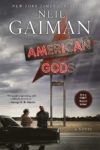Future Visions
Tuesday, March 28th, 2017 Commenting that “All science-fiction novels are about the future and about the present at the same time,” Kim Stanley Robinson discusses his new book New York 2140 (Hachette/Orbit; Blackstone Audio; OverDrive Sample) in an interview with New York magazine. In it, he envisions a waterlogged city that climate change has turned into the Venice of the U.S.
Commenting that “All science-fiction novels are about the future and about the present at the same time,” Kim Stanley Robinson discusses his new book New York 2140 (Hachette/Orbit; Blackstone Audio; OverDrive Sample) in an interview with New York magazine. In it, he envisions a waterlogged city that climate change has turned into the Venice of the U.S.
It is one of a number of novels getting media attention for their prescience about the current political climate,
A surprisingly hopeful version of what lies ahead, Robinson’s books shows survivors coping with the aftermath of an epic flood that has hit NYC. They move into high rise buildings, get used to tides washing up the streets, and to living with canals rather than roads. Robinson says “at some point, science fiction has to imagine the people who come after, when the situation will be natural, whatever it is.”
In her monthly Sci Fi column in the NYT Book Review, N.K. Jemisin says Robinson “deftly conveys [the transformed city’s] unnerving strangeness … it is refreshing to see a futurism that acknowledges the innate resilience of the city and, by inference, of humanity itself.”
 Wired compares it to John Scalzi’s newest, the space opera The Collapsing Empire (Macmillan/Tor; OverDrive Sample), a far less hopeful vision set in AD 3500 when humanity appears doomed. They call it “Star Wars politics in the key of Firefly,” while New York 2014 could be pitched as “Waterworld survivalists battle Wall Street bogeymen.”
Wired compares it to John Scalzi’s newest, the space opera The Collapsing Empire (Macmillan/Tor; OverDrive Sample), a far less hopeful vision set in AD 3500 when humanity appears doomed. They call it “Star Wars politics in the key of Firefly,” while New York 2014 could be pitched as “Waterworld survivalists battle Wall Street bogeymen.”
 Daily NYT critic Michiko Kakutani devotes her attention to a novel that, like Robinson’s, imagines the impact of global warming on the U.S., Omar El Akkad’s American War (PRH/Knopf; RH Audio; OverDrive Sample). In this darker version, the U.S., reduced to a much smaller country, is engaged in second Civil War.
Daily NYT critic Michiko Kakutani devotes her attention to a novel that, like Robinson’s, imagines the impact of global warming on the U.S., Omar El Akkad’s American War (PRH/Knopf; RH Audio; OverDrive Sample). In this darker version, the U.S., reduced to a much smaller country, is engaged in second Civil War.
Kakutani says “El Akkad has fashioned a surprisingly powerful novel — one that creates as haunting a postapocalyptic universe as Cormac McCarthy did in The Road (2006), and as devastating a look at the fallout that national events have on an American family as Philip Roth did in The Plot Against America (2004).”
Released today, the book is currently at #71 on Amazon’s sales rankings, moving up rapidly from a lowly #29,600.















